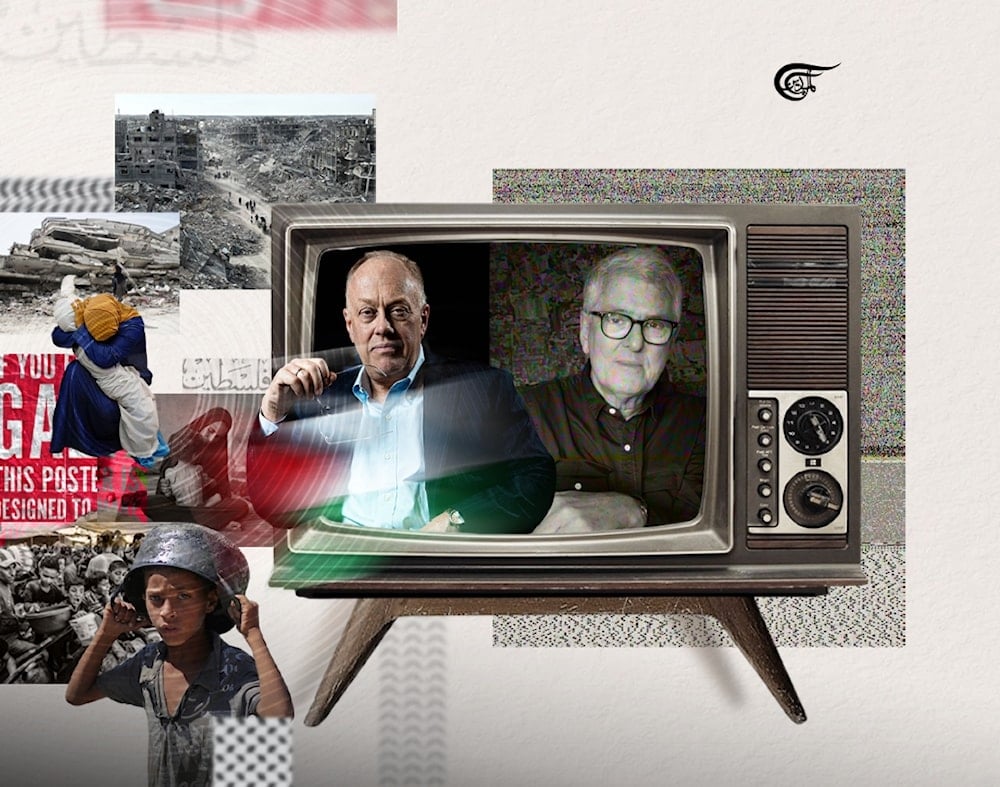Western journalists know they have a case to answer for their betrayal of Gaza, and it frightens them
Samuel Geddes exposes Western journalists’ fear of accountability for their complicity in "Israel’s" Gaza genocide, highlighted by the silencing of veteran reporter Christopher Hedges for confronting their moral and professional collapse.
-

What Marr evidently didn't seem to understand was that Hedges isn't saying that Western journalists manipulate the truth, but that they systematically amplify Israeli narratives they know are false. (Al Mayadeen English; Illustrated by Batoul Chamas)
Pulitzer Prize-winning war correspondent and former Middle East Bureau chief for The New York Times, Christopher Hedges, this week delivered the Edward Said memorial lecture in Australia. He had also been invited to address the country’s national “Press Club” in which he was to highlight the overwhelming moral failures of Western establishment media outlets, chiefly by amplifying Israeli propaganda and undermining the credibility of journalists in Gaza, most of whom "Israel" has subsequently killed in its decimation of the territory’s population.
It shouldn’t really have come as a surprise then, when the Press Club rescinded its invitation to Hedges on the grounds of “balancing out” its programming. Whether or not the withdrawal was directly influenced by Israeli pressure, the collective media aristocracy of the country would hardly have looked forward to the prospect of an actual, decorated reporter scathingly indicting them to their faces on their systematic malpractice and dereliction of duty that has contributed to perhaps the definitive atrocity of the 21st century.
Stalwart ABC journalist David Marr came out to defend “The Club” in a radio interview with a furious Chris Hedges. Rather than seek to engage with the content of what his speech would have been, Marr set about using his training as a barrister to ambush the real journalist in the room, smearing the sponsorship of his tour by a Palestine advocacy group as a “fundamental breaking of the rules,” according to his definition of journalism.
Beneath the sniveling pettiness and affected outrage of his attacks on Hedges, lurked a palpable sense of indignation that anyone, least of all a decorated journalist, would attack his “club” of establishment approved media personalities for having not done their job, to the point of betraying those Gazans practicing journalism in its purest form.
Marr, whose career is not particularly distinguished by international reporting, much less from a warzone, attempted to impugn Hedges’ authority on Gaza (where he lived for seven years) by pointing out that he hadn’t been in the territory since 2005 and hence his lack of recent experience there might not have measured up to the Club’s exacting standards.
The substance, to the degree there was any to Marr’s arguments, was that those organizations, Sky News, CNN and Reuters, by privileging Israeli talking points about the victims of their attacks, was merely standard due journalistic diligence of including "Israel’s" “perspective” in the interests of balance.
Hedges immediately and rightfully fired back that the job of a journalist is to tell the truth, not to balance it out with lies. "Israel’s" excuses and misdirection do, of course, merit being referred to, but not in a way that explicitly lends them credibility, by literally headlining the report.
What Marr evidently did not seem to understand was that Hedges is not saying that Western journalists manipulate or distort the truth. It is that they systematically amplify Israeli narratives which they know to be false, in a way that drowns out the truth of the story. This creates a false equivalence between Palestinian and Israeli “narratives.” It is precisely this mixing in of lies with truth that allowed "Israel" to get away with killing almost all professional reporters working in Gaza, along with untold numbers of other civilians.
While culpability is by no means exclusive to the Western mainstream press, it is unquestionably responsible for curating a global media discourse that manufactures the kind of doubt and hesitation that has permitted a livestreamed genocide to be perpetrated with full state complicity without consequence.
Perhaps the only valuable insight to be drawn from Marr’s affected and clearly unsuccessful attempt to pillory a journalist worth the title is that leading Western career journalists are, on some level, aware of their complicity. Like the endlessly weaponized accusations of anti-Semitism against opponents of the Israeli regime, it is not borne out of real anger but of a desperate attempt to intimidate those speaking the truth into silence.
There will inevitably come a point at which countless individuals and institutions in Western societies will be called to answer for their conduct during this genocide. That realization seems only now to be tentatively dawning on them.

 Samuel Geddes
Samuel Geddes
 4 Min Read
4 Min Read










